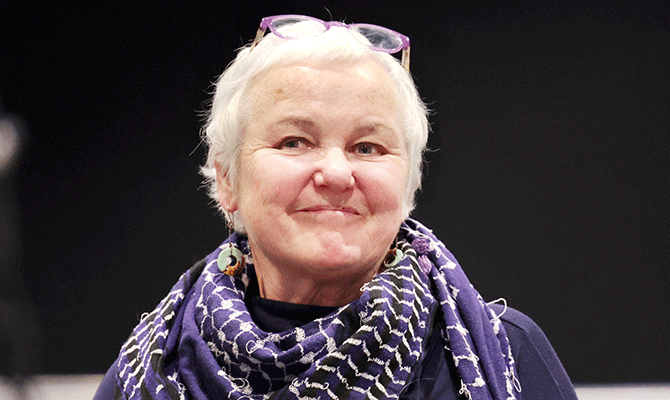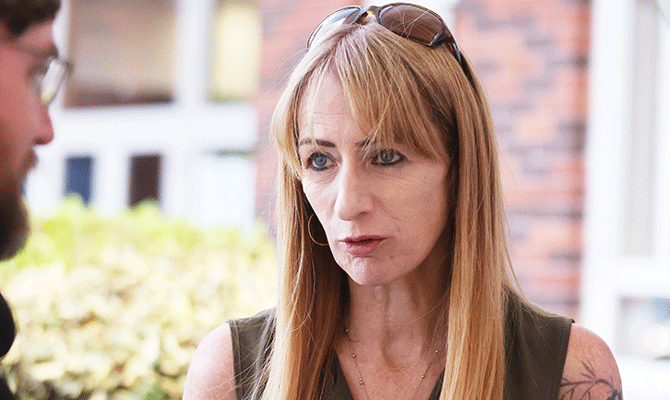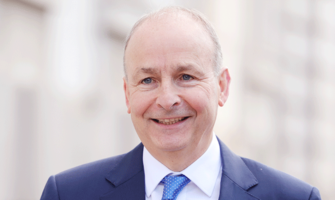
Brid Smith
RECENT ELECTIONS stimulated much discussion about the centre-right, far-right, centre-left, Sinn Féin and so on, but very little about the small but sometimes significant far-left movement, whose main personality for some years now has been former MEP Clare Daly. A favourite trope of right-wing critics is that the left is irredeemably riven and prone to splits and the recent EU election in Dublin confirmed this prejudice. Another socialist personality, People Before Profit TD Bríd Smith, who last July announced her intention to retire from the Dáil, nevertheless entered the EU Dublin contest and, despite not being in the final hunt for a seat, was the main reason that Daly lost hers. The Socialist Workers’ Party, which controls PBP, felt the need to rival Daly in the EU Dublin election as she had emerged as the principal Irish voice of the far left in foreign conflicts such as Ukraine and Gaza. Such party-political sectarianism is just one reason why the far left now faces electoral devastation.
Proving that disingenuous nonsense is not the sole prerogative of establishment politicians and spin doctors, Bríd Smith and PBP stated that two left seats – apart from Sinn Féin – were up for grabs in the four-seat Dublin EU constituency. It is hard to imagine that the PBP comrades and Smith did not have difficulty themselves believing this, especially in the face of incredulity from other left groups and individuals, who were shocked at such blatant sabotage of Daly’s re-election prospects.
The first count in the Dublin EU contest saw Daly on 26,855 votes to Smith’s 21,577, putting Daly at a disadvantage straight away in later counts. The last seat was a four-way fight between Daly, new-right candidate Niall Boylan, the Green Party’s Ciarán Cuffe and the eventual winner, Labour’s Aodhán Ó Ríordáin. But as the 17th count showed, Smith’s transfer to Daly of 6,464 – out of her then total of 39,334 (one sixth) – was derisory evidence of left unity or the prospect of two far-left seats.
Ó Ríordáin is heartily disliked by those socialists who recall his role in coalition with Fine Gael but it could have been even worse, with Boylan of the new-right coming close enough to taking the seat – a result that would have caused apoplexy at the PBP/Smith intervention.
Within 24 hours of Daly’s defeat, Bríd Smith told radio and television audiences that she was making an appeal for left unity with a cynicism that would make any FG or Fianna Fáil politician blush.
Daly is a serious loss not just to the left but to the wider progressive movement in Ireland. Along with partner Mick Wallace, she had become the most articulate and persuasive voice for Irish neutrality; for traditional Irish foreign policy of non-alignment and self-determination for nations dominated by the West; and a rallying cry against the genocide of Palestinians in Gaza. This was what made her a target for both right-wing opponents and jealous far-left rivals in the SWP/PBP.
Daly’s defeat was described by many as down to a pincer movement by the Irish Times and Smith’s PBP. The IT was not the only media outlet that damned Daly and Wallace and the Irish edition of the Sunday Times – Whitehall’s favourite Irish newspaper – also did its best as did others. The IT, however, led the charge with what it described as a 10-month investigation into the duo back in 2022 (see The Phoenix 6/5/22). These and other media encouraged the belief that the pair had supported the Russian invasion of Ukraine, despite their consistent condemnation of the invasion and repeated votes to the same effect in the EU Parliament.
Their real offence was that they also condemned Nato and some EU countries for engineering a situation that provoked the Russian invasion.
‘THAT’S POLITICS’
Bríd Smith came under fire for her central role in the Daly affair but she batted away such criticism saying that, if she unseated Daly, sure “that’s life and that’s politics”.
In a period when the new right is beginning to grow and the centre-right FF/FG believe they can return to power at the general election, this socialist electoral fiasco is hard to understand unless one looks at the past and the future of the parties involved.
For the last 25 years the far left has, on the one hand, grown to present a small but significant force in Irish politics while at the same time savaging each other, with the main warriors being the SWP and its mortal enemies, the Socialist Party. Following the 2011 general election, the United Left Alliance (ULA) combined TDs Joe Higgins and Clare Daly (SP); Richard Boyd Barrett (SWP/PBP); Joan Collins (PBP but non-SWP); and Independent socialist Séamus Healy. After much squabbling between the SWP and SP, the ULA fell apart in 2012.
A rationalisation of this split by SWP/PBP was that the SP and Healy were too conservative to accept a proposal to declare a ULA party. This revisionist explanation ignores the reality that the SWP/PBP – with one TD to that of the two SP TDs and an Independent, Healy – proposed that the five TDs should come under the political direction of the ULA rank-and-file members (dominated by PBP/SWP members), meaning the Dáil balance of forces would be effectively reversed in favour of the SWP, which is why it was rejected.
It was Karl Marx who said: “History repeats itself, first as a tragedy, second as a farce”. In 2014 Paul Murphy, then the SP’s Dublin MEP, was gearing up to retain his seat in the EU elections but was ambushed by a SWP/PBP candidate who declared an intention to run in Dublin, thus splitting the left vote. The candidate? Bríd Smith. And the arguments for this vote-splitting exercise? Well, there were two seats there for the taking by the left – in a three-seat constituency. Sounds familiar, as was the result – Murphy lost his seat, polling 29,953 first-preference votes to Smith’s 23,875, a near-perfect split that shafted Murphy, similar to Daly’s experience this month.
Following the election back in 2011, further intense factionalising moved from the bin charges to water charges campaigns, with some hilarious public spats between the two parties. But the 2016 election saw six far-left TDs elected – three from each group, whatever the acronyms – and a truce of sorts was negotiated to ensure maximum Dáil speaking rights. However, this delicate equilibrium was shattered at the 2020 general election, which saw the three SWP TDs – Smith, Boyd Barrett and Gino Kenny – re-elected but just one SP TD, Mick Barry in Cork North-Central. Also, the SP’s TD, Murphy, defected to PBP, making it effectively 4-1.
Thus, the initial ascendancy of the equally party sectarian SP was overthrown by the SWP. Unfortunately, the ultra-competitive tendencies of the SWP did not disappear, as its role in undermining Daly showed.

Clare Daly
REINVENTION OF SWP
Bríd Smith has been a bright star for the SWP as a TD and one of her best initiatives was in leading the reinvention of the party as a champion of climate change. She helped to seriously embarrass the Greens at the Oireachtas joint committee on climate where, along with SF members, she drafted amendments to improve Eamon Ryan’s insipid climate bill, causing much angst to Greens in Leinster House.
She also championed low-paid workers and drew the opprobrium of ‘right-thinking’ people with an attack on Judge Garrett Simons for his 2021 High Court ruling on low pay, pointing out that he was on over €200,000 pa. And she played an important role in the Repeal the 8th campaign and, more recently, in solidarity with Palestinians undergoing Israeli genocide in Gaza.
The SWP has a peculiar contempt for republicanism and it played little or no political role in the north during the Troubles and only a small part since. But a fascinating political divide, once again between the SWP and SP, is that the latter operates mainly in the Protestant working class, while the former concentrates in west Belfast and Derry City. Another divide is that the SP disagrees with a united Ireland or even a vote on the issue, while the SWP, as Smith publicly stated, is in favour of a border poll.
Both groups take their ideological fundamentals from parent groups in the UK. This is a little ironic in Smith’s case as she comes from a celebrated republican family and she was active in republican politics for some years before seeing the SWP light.
GENERAL ELECTION
The SWP/PBP now faces a dangerous general election that could see it losing three of its four TDs given the current political state of play. Smith’s successor as Dáil candidate, councillor Hazel De Nortuin, does not have the same profile or cred as Bríd Smith and, with SF unlikely to have the same tsunami of transfers as in 2020 – SF’s Aengus Ó Snodaigh then polled 39% first-preference votes – the SWP/PBP candidate is unlikely to succeed Smith in the Dáil.
Gino Kenny faces similar problems in Dublin mid-West and, while the constituency goes to five seats from four, Kenny will certainly not have SF transfers in great numbers. Similarly, Murphy in Dublin South-West retains some hero status from the water charges campaign but this has diminished with time and a decline in his local activism. He too will need SF transfers that will not be as plentiful as in 2020.
Boyd Barrett will likely retain his seat because he has always captured middle-class and working-class voters but he could well be the only PBP member in the next Dáil.
The fact is that three out of the four TDs will depend on transfers from SF. But something of the delusions that exist in the SWP can be gleaned from a PBP position paper (written by leading SWP member John Molyneux two years ago), which says that PBP “will only consider joining the government, that is, taking ministerial posts, if its core demands are met”, before listing a plethora of hard-left demands that Molyneux knows could only obstruct the formation of a unified coalition government.
The new reality is that if SF’s vote declines at the general election, so too will that of SWP/PBP, which faces the possibility of near wipe-out. Meanwhile, other Independent socialists such as TDs Catherine Connolly and Thomas Pringle tend to stay clear of the factionalising bear pit of some far-left groups.
The party has only itself to blame for the suspicion that many on the left harbour for it. The demand for left unity is something that will or should be a burning issue for socialists but the EU election hit against Clare Daly has underlined for many on the left that the SWP prefers control to unity. The left alliance just formed on Dublin City Council includes PBP, Social Democrats and SF. PBP’s performance will be closely watched by the others.
Lenin is supposed to have said: “Trust is good, control is better.” The trouble is, there is no record of him saying it, no matter what the PBP appears to believe is good socialist practice.


















